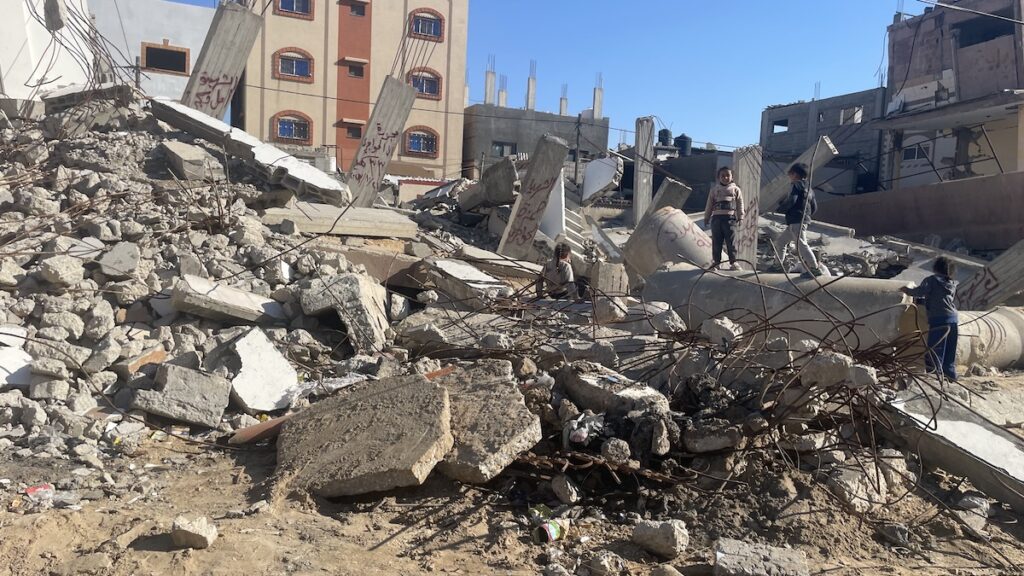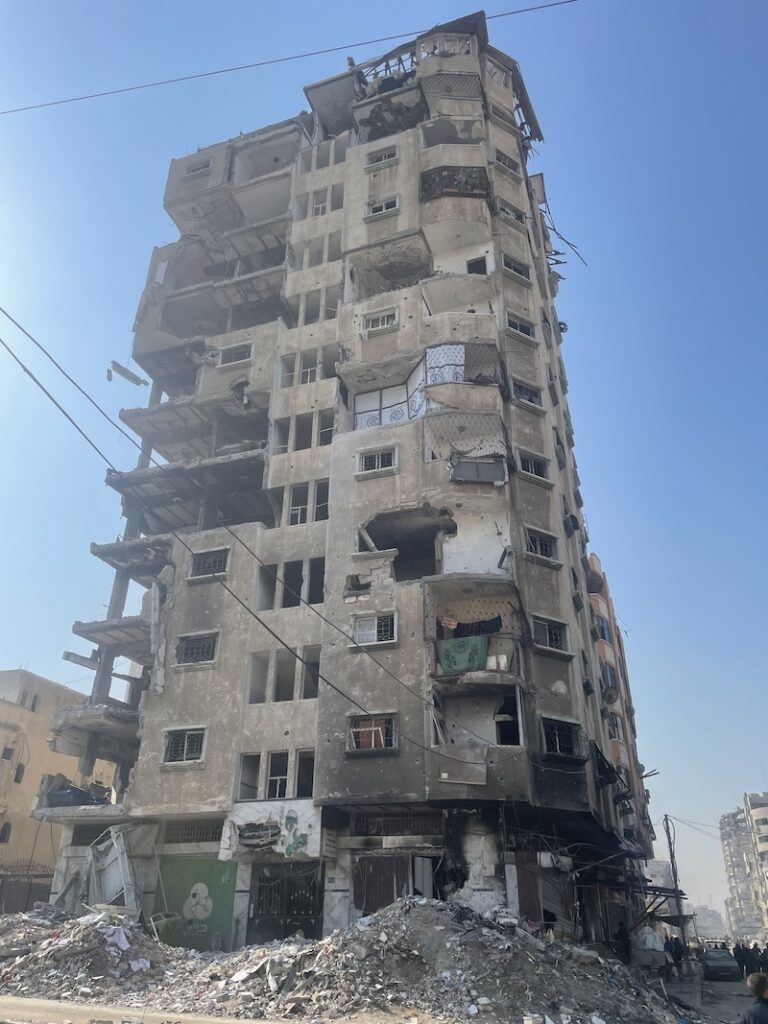Before Oct. 7, 2023, my world revolved around books and exams. I was completing my bachelor’s degree in English literature and preparing to apply for postgraduate studies abroad.
That morning, I woke up at 7 a.m. to my mother’s voice telling my younger siblings that there wouldn’t be school today. I had no idea what was happening then. But news spread quickly of the attack in Israel, and the Israeli forces’ brutal retaliation against Palestinians. As a refugee, I felt a momentary spark of hope: Could my family return to our original home in Battani village, some 20 kilometers north of the Gaza border in eastern Ashkelon?
But the violence escalated rapidly; electricity outages, disrupted internet and bombardments became a daily reality. My father had to go to his job, distributing vital medications from the Ministry of Health’s storage to hospitals across the Gaza Strip. We knew the risks he faced, yet we could not stop him.
By Oct. 13, my mother asked me to prepare a bag for evacuation. The Israeli occupation had threatened all of Gaza City. We left behind our apartment in Gaza City’s Al-Nasser neighborhood to live in a tent in southern Gaza’s Deir Al-Ballah, a designated safe zone.
Yet there were no safe zones in the whole Strip. Many massacres had been committed in Deir Al-Ballah, too; just over a week after we left our homes, the Israeli army massacred the Al-Hawajri family, killing nine individuals including a woman with her six children. The bombed house was less than 200 meters away from our new tent.

Life there was an endless struggle. We were eight families living in a room and a tent, with men living in the tent and women and children in the room. We evacuated with some small bags filled with clothes and other essential belongings; we did not have mattresses, blankets or pillows to sleep on.
I used to walk for hours searching for a place with stable electricity and high-speed internet to download lectures. Every lecture I completed felt like an act of resistance.
We lacked utensils, cooking gas or even food. We were sleeping on the floor and depending on aid to eat. Because of the high population of displaced people, potable water, washing water and hygiene products were scarce.
Displacement is often described as a single event — a moment when people flee danger. But in Gaza, it became our state of being. For months, I felt my sense of purpose dissolving. Every day was a repetition of the same struggle: fetching water, waiting for bread, chopping firewood. But education gave me something to hold on to.
In August 2024, the Islamic University of Gaza, where I had been studying, declared its plan to resume classes through an online learning system. Studying amid displacement was far from easy. I used to walk for hours searching for a place with stable electricity and high-speed internet to download lectures. Every lecture I completed felt like an act of resistance.
This spring, I graduated with excellent grades. Yet the shadow of loss remains. My classmate and best friend, Mohammed Hamo, had always dreamed of completing his bachelor’s degree in English translation and pursuing a master’s degree in journalism. Yet Mohammed was killed with his family on Nov. 24, 2023. His dreams were shattered.
When the previous ceasefire deal commenced at the beginning of 2025, I walked back to my family’s apartment in Al-Nasser. The home had been partially destroyed under Israeli fire, but I slept in it for a week, filled with joy that the nightmare of displacement had come to an end. While my family remained in southern Gaza because my father’s job had been transferred there, at least we had the freedom to go back to our home and gather with friends from our neighbourhood.
But it was short-lived. By March, the Israeli occupation had violated the ceasefire agreement and targeted civilians throughout the Strip, and by September, the Israeli occupation threatened Gaza City once more, forcing hundreds of thousands of people to evacuate south. Despite the danger, the next morning, I went back north to our Gaza City apartment to transfer the remaining of our family’s belongings to the south. There would likely never be any chance for us to return, we realized.

The world often speaks of displacement in numbers, but behind every statistic is a story of interrupted lives, broken dreams and stubborn hope. According to UNRWA, more than 1.7 million Palestinians — over 75% of Gaza’s population — were displaced during the first year of the war. Many were forced to move multiple times as bombardments followed them southward. Families who had already been refugees since 1948 became displaced once again. This recurring uprooting is not accidental; it is part of a systematic attempt to dismantle Palestinian life, memory and continuity.
And yet displacement has not erased Gaza’s determination to live. When Ireland and the U.K. evacuated their scholarship students from Gaza, I was inspired to apply for scholarships. I realized that displacement could take away my home but not my purpose.
But the obstacles remain immense. As I prepared my university documents to apply for international scholarships this fall, I faced a new wall: the impossibility of taking an English proficiency test. IELTS and TOEFL exams were unavailable in Gaza. Even the online Duolingo test was nearly impossible due to unstable electricity, noise and the absence of privacy in overcrowded shelters.
The ceasefire might have stopped the bombs, but we remain scattered, our lives paused, our futures uncertain.
There’s a new ceasefire in place now, but the fragile peace has not brought homecoming or given life to my friends and family members. Our neighborhood is gone. Two of my best friends and two relatives have been killed. The ceasefire might have stopped the bombs, but we remain scattered, our lives paused, our futures uncertain.
Although the road between the north and south reopened after the agreement, many families here — including my own — have no plans to return.

Osama Adas, my friend, lost his home weeks ago. “I would return to pull what would be left of my family’s belongings from under the rubble and transfer them to the south,” he told me. After enduring multiple displacements, Osama feared that returning home would only mean being uprooted again.
For us, remaining in the south — despite the harsh conditions — feels safer than rebuilding lives that could be shattered once more. The uncertainty of safety has turned displacement itself into a fragile form of stability.

